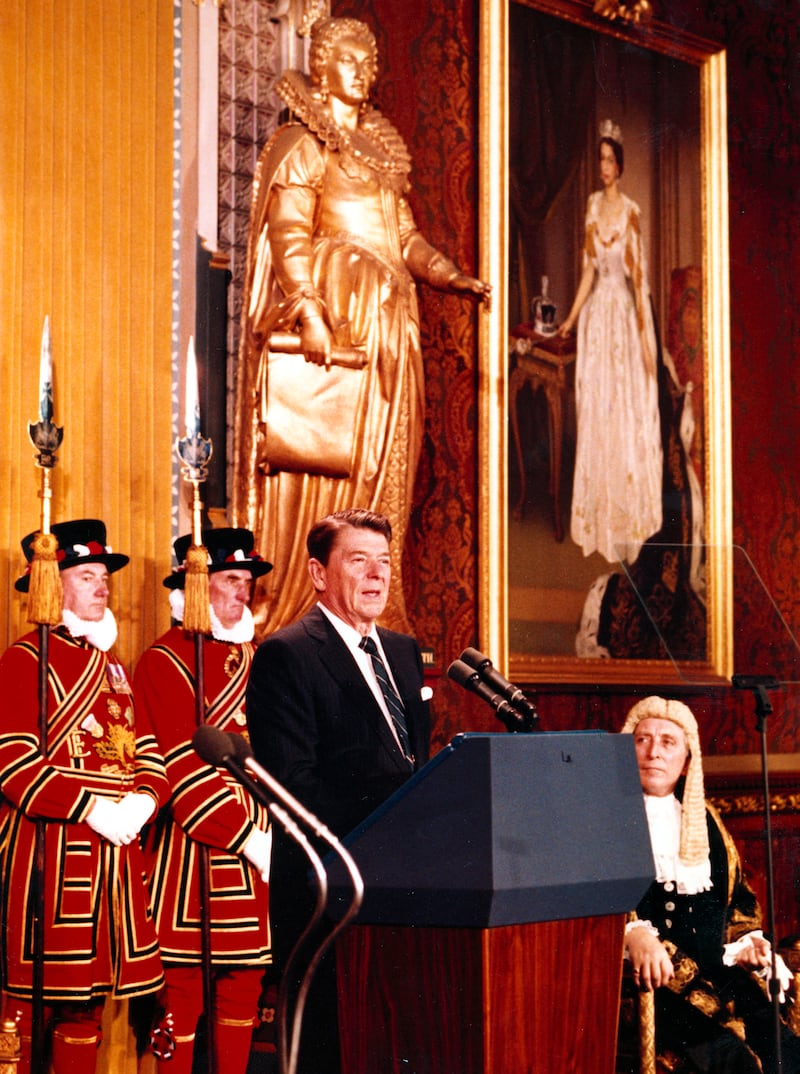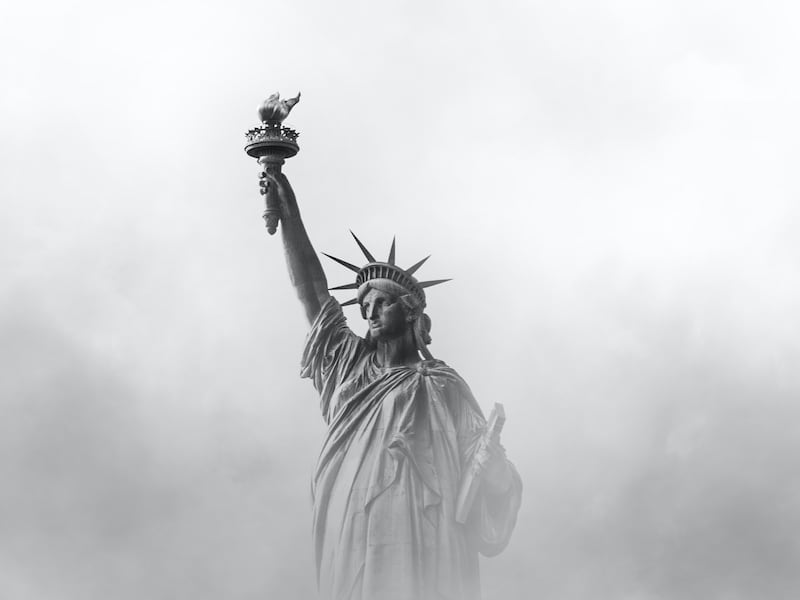Forty years ago, at the height of the Cold War, President Ronald Reagan addressed the British Parliament and laid out a vision to support freedom and democracy around the world. His vision was bold, almost unrealistic, in its aspiration.
The U.S. had supported democracy, good governance and human rights for decades before the landmark Westminster Address on June 8, 1982. But Reagan put forward a compelling vision that was universal in its appeal and at the same time advanced America’s ideals and interests.
Republicans and Democrats should recommit to the “Spirit of Westminster” for this new age of great power competition. Like Reagan, we should not be afraid to dream of freedom in places that seem highly unlikely today. Given the challenges in the world we should revisit the architecture of our soft power that supports this critical work.
Looking back, the U.S. has long been a champion of democratic movements; for example, in the early 1800s, America supported Greece’s independence from Ottoman occupation. In large part due to Eleanor Roosevelt, the U.S. was a major architect of the Universal Declaration of Human Rights. She chaired the U.N. Commission on Human Rights beginning in 1946 which put forward a historic human rights agenda, setting a standard for human rights worldwide.
But Reagan crystallized an American vision for supporting democracy and human rights. He was able to attract influential partners to this vision, both among key Democratic constituencies and in the Democratic Party itself.
The late Dante Fascell, a Florida Democrat who chaired the House Committee on Foreign Affairs, was a key ally and partnered with the president to establish the National Endowment for Democracy, or NED, the network of organizations set up in response to the Westminster speech. Also instrumental to bringing Reagan’s vision to fruition was Lane Kirkland, president of the AFL-CIO from 1979 to 1995 and renowned leader of the labor movement in the U.S. and abroad. Kirkland put his political capital behind the National Endowment for Democracy and later served on the board of the organization.

Democrats’ voices were augmented by those within the Reagan administration who played important roles, such as Elliott Abrams, who was then assistant secretary of state for human rights and humanitarian affairs and who now serves on the board of directors at the NED. Peter McPherson, then administrator for the U.S. Agency for International Development, was a supporter. Presidential counselor and close Reagan confidante Ed Meese accompanied Reagan to Westminster.
Reagan drew inspiration from West Germany’s Stiftungen, or “party institutes.” Germany’s political parties had international arms which sought to work with think tanks, political parties, legislatures and civil society to strengthen democracy. They played an important role in supporting the democratic transitions of Spain and Portugal during the 1970s.
Reagan and his partners in the Democratic Party envisioned the NED having several related institutions as part of its “family” with four related institutes with ties to the two major political parties (the National Democratic Institute and the International Republican Institute), the U.S. Chamber of Commerce (the Center for International Private Enterprise) and organized labor (the Solidarity Center).
With authorization from Congress, the National Endowment for Democracy was established in 1983. This bipartisan, publicly funded, privately operated institution dedicates about half of its budget to the four associated institutions. The founding president of NED, Carl Gershman, was critically important to realizing this bipartisan vision. Up until their recent deaths, Madeleine Albright chaired NDI and John McCain served as chairman of IRI.
After the National Endowment for Democracy was established, there was a recognition of the need to support the architecture of free and fair elections. A separate institution, the International Foundation for Electoral Systems, was established a couple of years later with financial support from USAID.
Much like today, Reagan called for greater efforts to support freedom in the world at a time of great power competition with the Soviet Union. The Soviet Union was advancing a vision of government that crushed freedom, including religious freedom, and sought to advance that vision in the world. Reagan journeyed to major cities in Europe seeking a united front against totalitarianism and the promotion of democratic ideals. Today, we face the dual challenge of aggressive authoritarian regimes in both Russia and China, and Reagan’s message is just as important today.
Reagan was deeply committed to human freedom and human dignity as ends in themselves, emphasizing that “freedom is not the sole prerogative of the lucky few.” However, he also recognized that the world is more secure and more peaceful when democracy flourishes, saying that if the free world had supported democracy abroad “some 45 years ago, perhaps our generation wouldn’t have suffered the bloodletting of World War II.”
The twin realizations of democracy and human freedom are not just in the interest of the millions of citizens living at the mercy of oppressive regimes thousands of miles beyond our shores, but also have direct implications for the national security and prosperity of the United States. This is clearly demonstrated by soaring gasoline prices in the U.S. and global food shortages that are clearly linked to Vladimir Putin’s unjust invasion of Ukraine.
In his speech, Reagan advocated for more explicit government support of democracy promotion, recognizing that this was not a view held by many people. There were concerns about “covert” activities engaging in the political life of other countries. Reagan sought to make as transparent as possible America’s work in this area given the geopolitics of the Cold War.
The objection to “covert assistance” was based on the CIA experience in the 1950s and 1960s, and what we learned from that was that there was no way in the modern world to keep those sorts of interventions in foreign politics a secret; they would always leak. Reagan asked why anyone was ashamed of supporting democracy and placed leadership for supporting democracy in USIA, USAID and the State Department, along with the National Endowment for Democracy. He was right about the importance of being transparent.
At the time of Westminster speech, just over a third of the world lived in a democracy; today a majority of the world’s countries are democracies. No one anticipated a wave of democratic liberalization in Latin America nor would anyone have imagined the collapse of the Soviet Union within 10 years. However, despite the remarkable progress, we have lost ground in the past decade. In its 2022 Freedom in the World Report, the NGO Freedom House found that the world has experienced 16 consecutive years of decline in global freedom.
The 40th anniversary of the Westminster speech should remind us to lift our sights and have big dreams about freedom in the world. We should not be afraid to dream of a truly democratic China at peace with its neighbors. With Putin in the Kremlin, it’s hard to see when Russia might be truly democratic but it is possible. What about a peaceful “color revolution” in Iran, Venezuela, Nicaragua or Cuba? Why not freedom in the “Impossible State” of North Korea and possible peaceful reunification with South Korea?
Reagan also knew, just as human rights activist Natan Sharansky tells us, that dictatorships are brittle, unstable and afraid of their own people. We do not know the day nor the hour when freedom may break out.
To realize this vision, we must continue to invest in the people and institutions working with civil society and democratic activists around the world to make these dreams a reality. On this anniversary, we should revisit the architecture that supports this work, given the changed world we find ourselves in. We should look at our support of democratic movements around the world, as well as our approaches to public diplomacy and people-to-people exchanges. We are sure the Reagan Institute’s Westminster 2.0 Working Group will be a good jumping-off point for an extended debate.
Reagan partnered with Democrats, took a big risk and made a multidecade commitment to freedom. In the long run, he was proved right. Like Reagan, we should dream big and work toward a truly peaceful and free world. In his words, let us “foster the infrastructure of democracy — the system of a free press, unions, political parties, universities — which allows a people to choose their own way, to develop their own culture, to reconcile their own differences through peaceful means.”
Dan Runde is the senior vice president at the Center for Strategic and International Studies in Washington, D.C., where he holds the William A. Schreyer chair in global analysis. He is the author of the forthcoming book “The American Imperative: Reclaiming Global Leadership through Soft Power.” Elizabeth Hoffman is the director of congressional and government affairs and fellow at the Center for Strategic and International Studies. Previously, she was the director for government relations at the National Endowment for Democracy.

